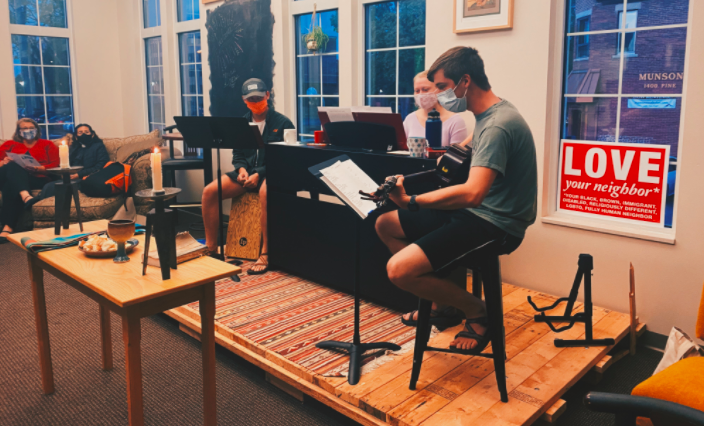Pastor Ben Morris speaks about Common Ground’s “new normal”
September 29, 2021
No one walks alone at Common Ground.
Known to most as by its shortened nickname Common Ground, LuMin at Common Ground is a University of Wisconsin-La Crosse ministry, and according to Pastor Ben Morris, a place for everyone. Pastor Morris begins his weekly worship on Sundays at 7:07 pm on the corner of 14th and Pine in the upstairs of Common Ground.
Every service begins with a welcome statement and Native land acknowledgment. Morris began with, “We believe that all people are created in God’s image. We are passionate about the radical hospitality that Jesus showed all people. We are committed to being a place of that same hospitality. We welcome all people to our life and ministry together – in worship, at the front, at the table, and in our life together regardless of race, gender identities, sexual orientation or any other category society uses to differentiate between people.”
LuMin’s purpose is about far more than worshiping. It is about getting ready for the journey of life. “LuMin is a faith community where you can wrestle with life’s big questions and travel with other folks on the journey.” Pastor Morris said they are here to “curate space for questions, community, and wonder.”
Some of the opportunities LuMin offers include:
Mondays:
Monday Morning Meditation (MMM) at 10:00 am
BE Mindful at 11:15 am in which members and guests can come to Common Ground and learn different mindfulness techniques and find that inner calm.
Tuesdays:
BE: Together, where members and guests can gather for outdoor get-togethers to hang out, have dinner, go for hikes, have campfires, woodfired pizzas, and sourdough bread.
Wednesdays:
BE: Fed at 11:00 am where members and guests can gather for soup and Bread with real butter every Wednesday. Vegetarian/Vegan-Friendly options are available.
BE: Joyful at 12:00 pm. Book Study on the Book of Joy by Archbishop Desmond Tutu and the Dalai Lama.
Thursdays:
BE: Centered, a 7:00 pm exploration of ancient Christian prayer practices from the Celts, the Desert Fathers and Mothers, and the mystical tradition.
Everyday:
Our building is open for study, prayer, silence, meditation, and conversation.”
Throughout this semester, a specific idea Pastor Morris will be discussing is subjects that correlate with liminality. Liminality is the idea of being in the in-between. Applied to today, everyone can relate to living in liminal times. Pastor Morris said, “Normal is what gave us the pandemic, normal is what gave us ecological disasters, normal has given us homophobia and transphobia.”
Pastor Morris further expanded and said, “When you’re in an era where the stories no longer work and when the metaphors societies use to give themselves meaning start crumbling, it’s terrifying. What you lose in that moment is certainty and there is nothing the human brain wants more than certainty.”
Because, as Pastor Morris said, change is always persisting and the future does not wait, “We are at a reflection point, literally as a species. We either make it out of this together or we don’t know exactly what it’s going to look like. [But,] we are not a healthy society, and we shouldn’t want to go back to that, and the beautiful thing is we don’t have to. We have way more agency together than we realize.”
The beauty behind liminal spaces and reflection points said Pastor Morris is, “People always make it to the other side of liminal spaces, and they rebuild the world.” Hope is not of limited quantity, but Pastor Morris said, “Hope is what happens when optimism runs out of gas [and that’s where we have found ourselves].”
Regardless, the current generation of young adults has hope. Pastor Morris said, “You’re all realists but you’re [generation] is hopeful.” Ultimately, the key to change is channeling hope. Morris said in channeling this hope, “My goal is not to get people to think a certain way. My goal is to get people together, ask big questions, talk about Jesus and God, and then I just trust that God’s God and you’re you, and things will work themselves out, we don’t need to argue with each other.”
Doug Feyen, a Junior at UWL, found his place at Common Ground. Feyen said, “What has brought me back here time and time again are the incredible people here in this building and just the sense of unity that comes from this place. We all come from different backgrounds, philosophies, ideas, but in the end, we all meet here together.”
At the end of the day, Morris said, “We want everyone to see Common Ground as a Community Center, not just a place for worship…If there is one thing I want people to know is, this building is open for you. It’s a space for everybody and I want people to know that they are welcomed at any and all of it.”

